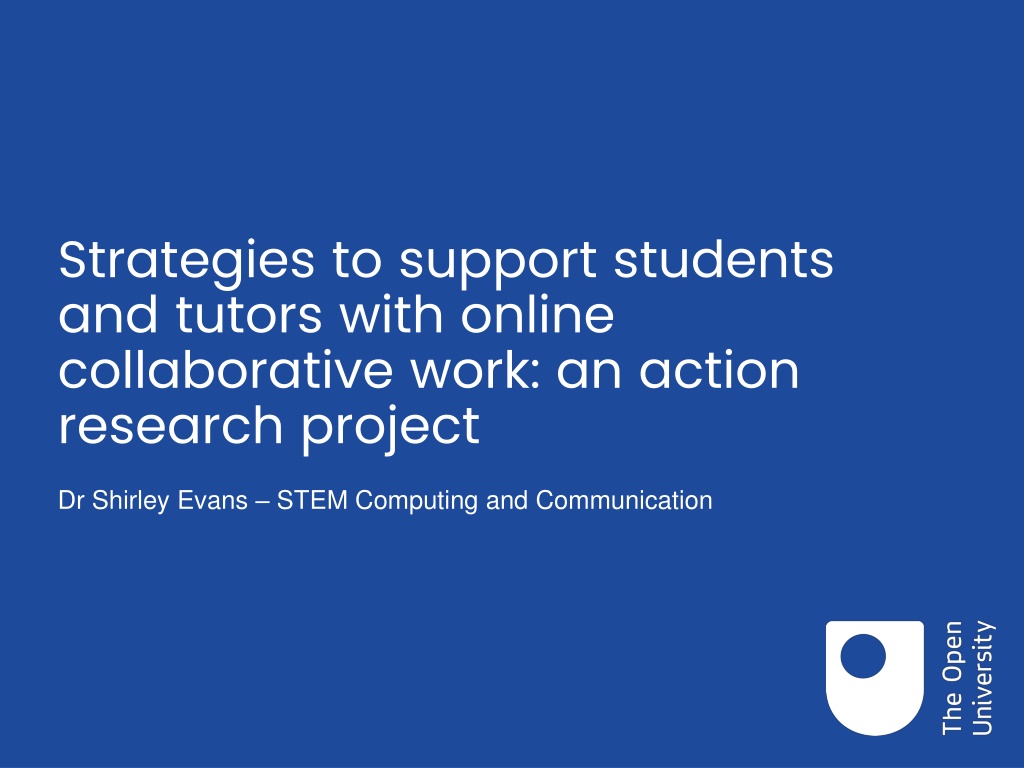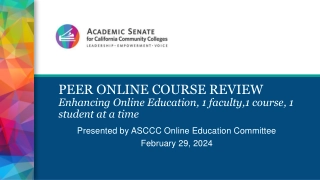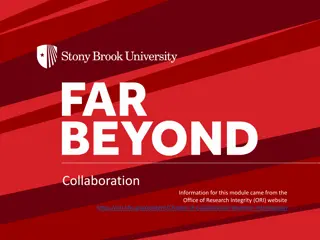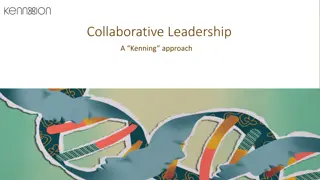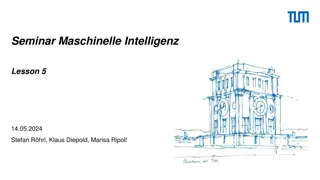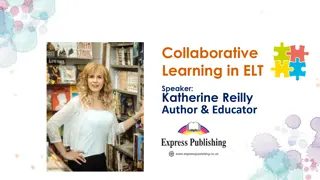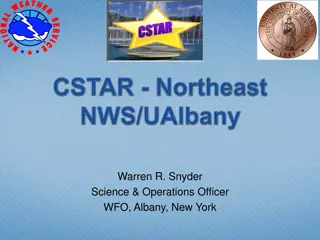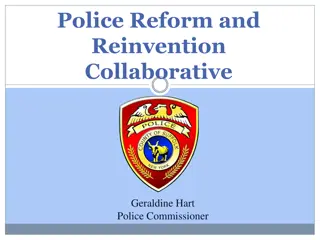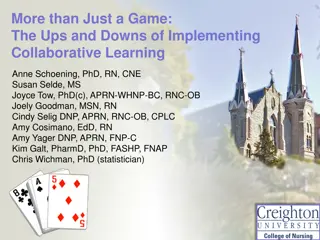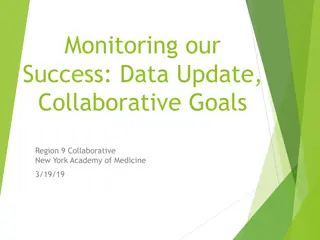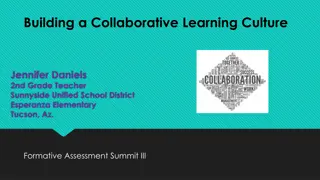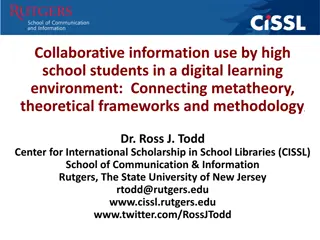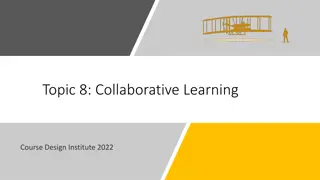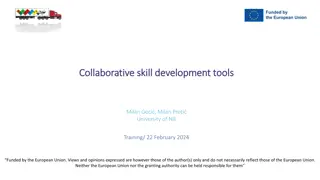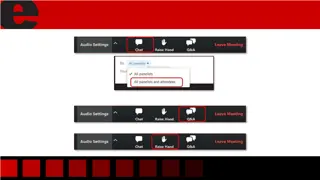Strategies for Successful Online Collaborative Work in Education
Dr. Shirley Evans conducted an action research project to explore effective strategies for supporting students and tutors in online collaborative projects. The research aimed to identify optimal support methods, produce resources for tutors, and address challenges faced in managing online group work. Changes in the educational context over the years were considered, and a mixed-methods approach was used for data collection. Strategies implemented included regular communication with students, providing guidance for tutors, and developing exemplar messages for effective collaboration.
Download Presentation

Please find below an Image/Link to download the presentation.
The content on the website is provided AS IS for your information and personal use only. It may not be sold, licensed, or shared on other websites without obtaining consent from the author. Download presentation by click this link. If you encounter any issues during the download, it is possible that the publisher has removed the file from their server.
E N D
Presentation Transcript
Strategies to support students and tutors with online collaborative work: an action research project Dr Shirley Evans STEM Computing and Communication
Research question and aims The research question is: How can tutors best support students to successfully engage in online collaborative projects? The aims of the research are to: Better understand which strategies best support students to engage with online collaborative projects. Better understand which strategies best support tutors to support students. Produce tips, guidelines, training materials and resources to support tutors to help concerns before and during the activity with a view to optimising learning for students.
Why? Tutoring T215/TM255 for 11 years and have never been satisfied with :- Allocating students to groups Keeping a handle on what is going on Managing engagement Knowing who has contributed what/communication channels Marking time allocation/personalised feedback; high level of distinctions lack of spread of marks Quite time consuming, quite onerous and feeling of anxiety goes on for 2 months
Context Changes over the 11 years include:- Less engagement students doing more modules Studying for different reasons student profile changed Less face to face used to be 4 or 5 meetings at Regional Centre (students coming from same geographical area) Changes to assignment Timing over festive period Complexity of task Less contact with other tutors working in isolation
Methodology A mixed method action research approach was taken. Qualitative data was collected to gauge perceptions of strategies implemented. Quantitative data from the module was used to ascertain student online activity, success and retention rates as agreed with the Module Chair. Tutors directly involved kept a reflective diary of student support which included a record of strategies used and reflection on how successful they were, how time consuming and how stressful they found them. Students were interviewed/surveyed before, during and after the group work to help understand their experience. Tutors were surveyed post group work to gauge their experience and a sample were interviewed to follow up on key points.
Strategies implemented Tutors rang/contacted students before the start of the group work, mid-way and post group work Weekly bulletins for tutors developed as to what was coming up and which they can personalise for their tutor groups Exemplar messages for tutors to post with clear information as to what takes place and when. Tutors to ran individual project group session at start of group work. Worked example (s) of how students should engage in the forums developed - how much is expected and the nature of the posts.
Summary of data collected 3 x tutors and reflective diaries 15 other tutor responses and 8 follow-up interviews 50% 12 students recruited (5, 4,3) interviews/questionnaires 20% Supplementary data Reflections on moderating Block 2 Forum TM255 student survey 11 years of reflection Module stats Forums
The issues Tutors Allocating students to groups Students Group coherence (tutorials) Social anxiety Student engagement Engagement of other students Students taking other modules Cisco exam Own engagement/time management/other modules Professional recognition of group work Communication channels Communication channels Q1 others starting late Assessing contributions Q3 lack of clarity Marking - standardisation (WordPress) Timing of TMA festive break Complexity of TMA Slow start with Q1 Q3 lack of clarity
The issues Module Team Retention - Student number: 631 registered at start, 585 at 25, 505 at week 22. Achievement Submission rates - TMA02 submission rate is 73.3% (TMA01 85.3%), compared to 78.8% of 18J Assessment scores - TMA01 70.2%; TMA 02 76.2% 5 of the tutors were concerned about retention 7 students from start of module; looking at cluster 4 out of 7 tutors had 7 students leave other 3 only 1 or 2. Some very high level of distinctions some very low need to look at spread Tutors did not think that students had left because of Block 2 and did not think they could have done more to stop them. Follow-up interviews could be useful. Survey 64% said the atmosphere of their group is positive 36% negative 70% satisfied with how things went 30% dissatisfied Negative atmosphere in forums generated by a relatively small number
Emerging themes/framework How can we encourage students to engage in online collaborative group work what are the incentives/drivers (purpose and professionalisation)? How can we encourage group formation and communication? Do we need to review the nature of tasksand how crucial is timing? How do we manage tutor and student expectations?
Potential Solutions Group set up generated from learning analytics previous results/engagement, tutor knowledge (discussion see below) possibly location Timing of task start group formation in TMA01, start group work in Jan Communication channel possible use of MS Teams for project group work give it a professional feel, alerts, discussion all in one place, asynchronous and synchronous communications, file storage, video calls Tutors have calls with individual students to set targets/discuss issues Tutors hold briefing session with tutor group TMA02 tutorial; possible facilitated project group meetings Tutors hold de-brief with group Complexity of task clarify questions or change or cut Q3 Continue weekly bulletins A standardisation exercise for tutors
What has changed? Module Group work discussion included in TMAs 1 and 2 More opportunities to discuss during tutorials TMA relating to group work moved to final Block Continue weekly bulletins for tutors what to do when do this as moderator of group work fora Own practice Group set up now later on in module tutors have a better idea how to populate groups Task more streamlined Tutors have calls with individual students to set targets/discuss issues will try it this year just at start of Block 3 Tried facilitated project group sessions as above works with those already engaged Tried Teams for group work over a couple of years it worked with a self-selecting group but not across the board
Thank you for listening Any Questions
References Booth, A. (1996) Assessing Group Work . In: A Booth and P Hyland (eds). History in Higher Education. Oxford: Blackwell, 276 297. Braun, V. & Clarke, V. (2006). Using thematic analysis in psychology. Qualitative Research in Psychology, 3, 77 101 Donelan, H. and Kear, K. (2017) Creating and collaborating: students and tutors perceptions of an online group project , International Review of Research in Open and Distributed Learning. Volume 19, Number 2 Fry, Heather, et al. A Handbook for Teaching and Learning in Higher Education : Enhancing academic practice, edited by Heather Fry, et al., Taylor and Francis, 2014. ProQuest Ebook Central Hilliard, Jake (2017). Students Perceptions and Experiences Of Anxiety In An Online Collaborative Project. MRes thesis The Open University. McCutcheon, G., & Jung, B. (1990). Alternative perspectives on action research. Theory into Practice, 29, 144-151. EJ417491 Salmon,G., (2004). E-Moderating: The Key to Online Teaching and Learning: The Key to Teaching and Learning Online. Taylor and Francis Seale, J., (2013), E-learning and Disability in Higher Education: Accessibility Research and Practice, Routledge
Thank you s.evans@open.ac.uk
